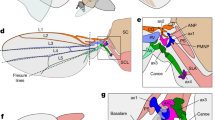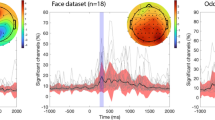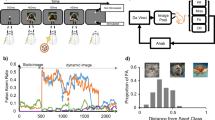Abstract
The learning of perceptual skills has been shown in some cases to depend on the plasticity of the visual cortex1 and to require post-training nocturnal sleep2. We now report that sleep-dependent learning of a texture discrimination task can be accomplished in humans by brief (60– 90 min) naps containing both slow-wave sleep (SWS) and rapid eye movement (REM) sleep. This nap-dependent learning closely resembled that previously reported for an 8-h night of sleep in terms of magnitude, sleep-stage dependency and retinotopic specificity, and it was additive to subsequent sleep-dependent improvement, such that performance over 24 h showed as much learning as is normally seen after twice that length of time. Thus, from the perspective of behavioral improvement, a nap is as good as a night of sleep for learning on this perceptual task.
This is a preview of subscription content, access via your institution
Access options
Subscribe to this journal
Receive 12 print issues and online access
$209.00 per year
only $17.42 per issue
Buy this article
- Purchase on Springer Link
- Instant access to full article PDF
Prices may be subject to local taxes which are calculated during checkout


Similar content being viewed by others
References
Zohary, E., Celebrini, S., Britten, K.H. & Newsome, W.T. Neuronal plasticity that underlies improvement in perceptual performance. Science 263, 1289–1292 (1994).
Stickgold, R., James, L. & Hobson, J.A. Visual discrimination learning requires post-training sleep. Nat. Neurosci. 2, 1237–1238 (2000).
Maquet, P. The role of sleep in learning and memory. Science 294, 1048–1052 (2001).
Takahashi, M. & Arito, H. Maintenance of alertness and performance by a brief nap after lunch under prior sleep deficit. Sleep 23, 813–819 (2000).
Dinges, D.F. & Broughton, R.J. (eds.) Sleep and Alertness: Chronobiological, Behavioral, and Medical Aspects of Napping (Raven Press, New York, 1989).
Mednick, S.C. et al. The restorative effect of naps on perceptual deterioration. Nat. Neurosci. 5, 677–681 (2002).
Fahle, M., Edelman, S. & Poggio, T. Vision Res. 35, 3003–3013 (1995).
Watanabe, T. et al. Greater plasticity in lower-level than higher-level visual motion processing in a passive perceptual learning task. Nat. Neurosci. 10, 1003–1009 (2002).
Karni, A. & Sagi, D. Where practice makes perfect in texture discrimination: evidence for primary visual cortex plasticity. Proc. Natl. Acad. Sci. USA 88, 4966–4970 (1991).
Karni, A. & Sagi, D. The time course of learning a visual skill. Nature 365, 250–252 (1993).
Stickgold, R., Whidbee, D., Schirmer, B., Patel, V. & Hobson, J.A. Visual discrimination task improvement: a multi-step process occurring during sleep. J. Cogn. Neurosci. 12, 246–254 (2000).
Gais, S. et al. Early sleep triggers memory for early visual discrimination skills. Nat. Neurosci. 3, 1335–1339 (2000).
Karni, A. et al. Dependence on REM Sleep of overnight improvement of a perceptual skill. Science 265, 679–682 (1994).
Acknowledgements
This research was supported by grants from the US National Institutes of Health (MH 48832, DA 11744 and NS 26985) and the Air Force Office of Scientific Research (83-0320).
Author information
Authors and Affiliations
Corresponding author
Ethics declarations
Competing interests
The authors declare no competing financial interests.
Rights and permissions
About this article
Cite this article
Mednick, S., Nakayama, K. & Stickgold, R. Sleep-dependent learning: a nap is as good as a night. Nat Neurosci 6, 697–698 (2003). https://doi.org/10.1038/nn1078
Received:
Accepted:
Published:
Issue Date:
DOI: https://doi.org/10.1038/nn1078
This article is cited by
-
Optimizing the methodology of human sleep and memory research
Nature Reviews Psychology (2023)
-
Space, time, and dynamics of binocular interactions
Scientific Reports (2023)
-
Sleep’s role in updating aversive autobiographical memories
Translational Psychiatry (2022)
-
A failure of sleep-dependent consolidation of visuoperceptual procedural learning in young adults with ADHD
Translational Psychiatry (2022)
-
Shining a Light on the Mechanisms of Sleep for Memory Consolidation
Current Sleep Medicine Reports (2021)



